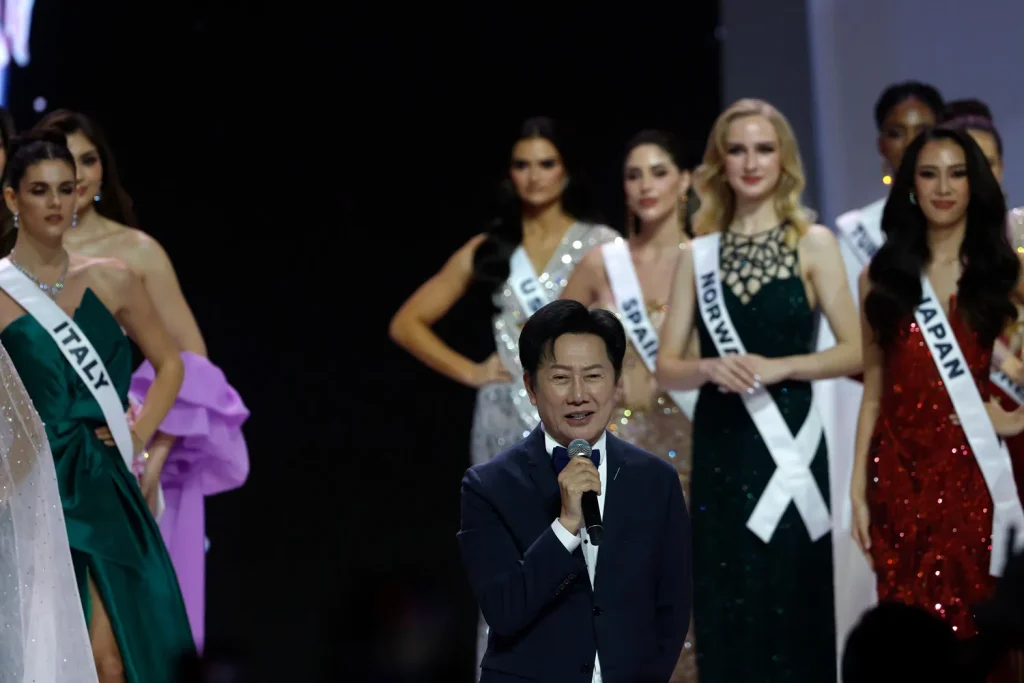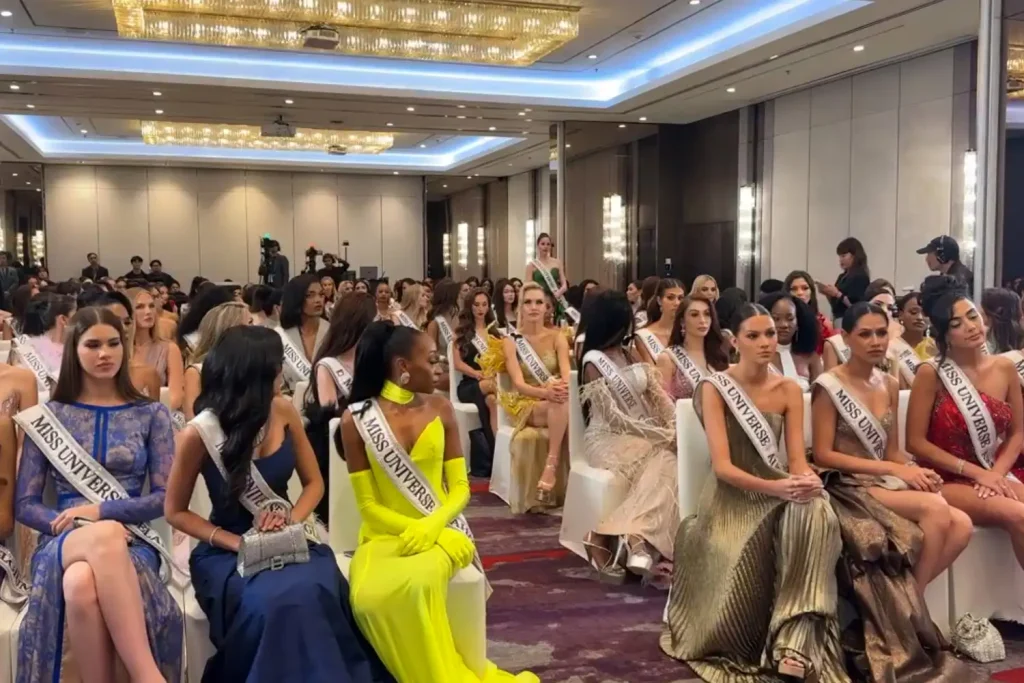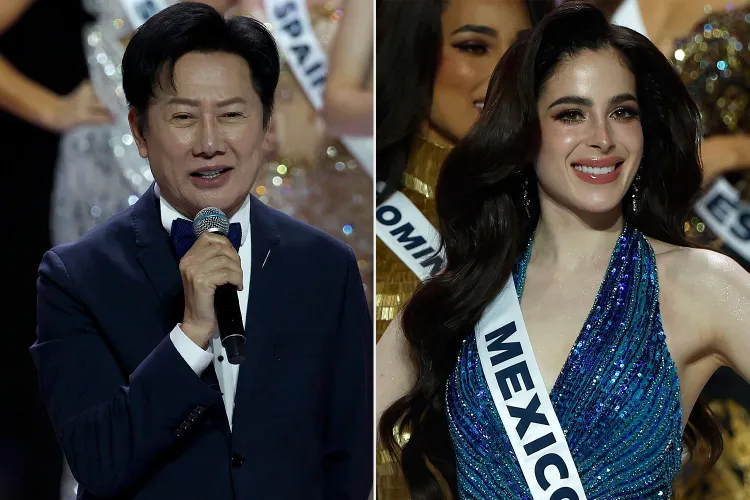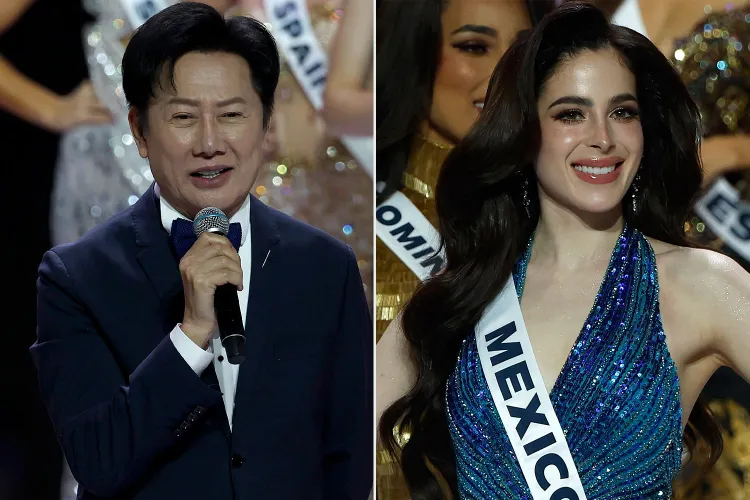When a Pageant Director Called Her “Dummy” — How Miss Universe Mexico’s Stand Sparked a Mass Walkout and Changed the 2025 Competition
The world of beauty pageants—glamour, grace, poise—can often conceal the pressure, hierarchy and power struggles behind the scenes. In early November 2025, when the Miss Universe 2025 competition began its pre-events in Thailand, one thunderous moment laid bare how brittle the veneer of spectacle can become. At the centre of it was a heated confrontation between Nawat Itsaragrisil, the Thai pageant veteran-turned-executive, and Fátima Bosch, representing Mexico, and in the aftermath the organisation itself stepped in, restrictions were applied and questions raised about respect, voice and accountability in pageantry.

The scene unfolded on November 4 during a sash-presentation pre-pageant event in Thailand, livestreamed on the official Miss Universe Organization Thailand Facebook page. Itsaragrisil publicly singled out Bosch, accusing her of failing to participate in a social-media-sponsored photo-shoot, allegedly following orders from her national director rather than his team. He asked pointedly, “Mexico, where are you? … I heard you’re not going to support everything about Thailand, is that true?”
Bosch, visibly taken aback, stood and responded—and was cut off. “Because I have a voice,” she said. “You are not respecting me as a woman.” But the disruption did not end there. Itsaragrisil interrupted again, calling her a “dummy” (or in his words, “dumb head”) and instructing security to escort her out of the room. The moment triggered more than a dozen contestants standing up in solidarity and walking out of the event.
The image of dozens of pageant hopefuls leaving the room as cameras rolled and livestreams played across social media shifted the story from pageantry to protest. What was meant to be a controlled prelude to the main competition became a defining moment of tension, as contestants, organizers and spectators alike were forced to reckon with how respect is administered in a pageant context.
The official response came swiftly. Raúl Rocha Cantú, President of the Miss Universe Organization, issued a statement condemning Itsaragrisil’s conduct: “I will not allow the values of respect and dignity toward women to be violated.” He announced that Itsaragrisil’s participation in official events for the competition would be restricted—“limited as much as possible or eliminated entirely” from the 74th competition scheduled for November 21 in Pak Kret, Thailand.

On a human level, Itsaragrisil later held a press conference on November 5 in Bangkok, visibly emotional, offering an apology. “I am human. I didn’t want to do anything like that,” he said, as reported by multiple outlets including People and USA Today. In the same event he stated: “If anyone was affected and not comfortable… I am so sorry.” And again: “I respect all of you.” These words came amid documented tears, tissue boxes and somber visuals of a pageant executive under fire.
Bosch, meanwhile, has spoken out firmly. She said she did everything as required and that it was unfair for her to be “silenced” or belittled. “Your director is not respectful. He called me dumb,” she said in a video interview in Spanish. Her comments elevated the incident into a broader conversation about the role of female power, voice and representation in pageants that have historically emphasised beauty above all else.
For the organisation, the stakes were high. The Miss Universe pageant counts itself among the world’s largest, widely broadcasted and commercially valuable events. A public walk-out, live-streamed confrontation and a top executive’s restriction threatened not only the event’s schedule but also its image of glamour, fairness and respect. Adding to the complexity: Itsaragrisil, a powerful figure in the pageant industry, holds multiple roles—president of Miss Grand International, national director of Miss Universe Thailand, and, as listed publicly, an executive affiliated with the Miss Universe franchise in Thailand.
From a storytelling perspective, this incident touches on multiple layers: the tension between national and international expectations, the influence of social-media sponsor commitments on delegates, the element of public performance and the vulnerability of contestants. Bosch’s articulation that she has a voice shifted the moment from mis-behaviour to movement. The walk-out by her peers underscored the depth of the discussion: this was not just one contestant vs one executive. It was a group of women in a high-stakes context saying “enough.”
What remains remarkable is how quickly the organisation moved to impose restrictions. Rocha’s decision to intervene, restrict Itsaragrisil and postpone the sash-ceremony to avoid further interaction signalled that the Miss Universe brand is aware of the need to prioritise respect and safety amid pageant spectacle. It was a message: the rules of beauty pageants extend beyond gowns and stages—they include dignity.

Yet there are unanswered questions. Itsaragrisil publicly responded by insisting the situation was a misunderstanding, claiming the word he used was “damage” not “dummy,” and seeking to clarify the Thai-English translation. Some believe this defence reflects deeper structural issues: licensing agreements, national-director autonomy, how content obligations to sponsors may pressure contestants, and whether executives wield too much power over much younger participants.
From Bosch’s vantage, the moment visits themes which she referenced directly: “We’re in the 21st century… I’m not a doll to be made up, styled and dressed up,” she told interviewers. Her words invite readers to consider the pageant not just as a contest of beauty, but as a forum for identity, agency and respect.
As the competition moves toward the final night on November 21, the under-current of this controversy will be hard to ignore. Delegates will walk the stage with full awareness that the pre-event walk-out will form part of the narrative of this year’s pageant. Audiences watching at home or on their devices may never see the “dummy” remark again, but they will sense the ripple effects of what preceded the crown.
In the end, the incident speaks to a broader cultural shift: a pageant industry historically built around curated perfection is facing growing calls for accountability. For the Miss Universe organization, the test is not just who wears the crown on the final night—it’s whether incident-control, respect, and proper conduct become part of the legacy. For the contestants, it is a reminder that visibility and voice matter—even in the most glamorous of settings—and that there is power in saying “Because I have a voice.”



